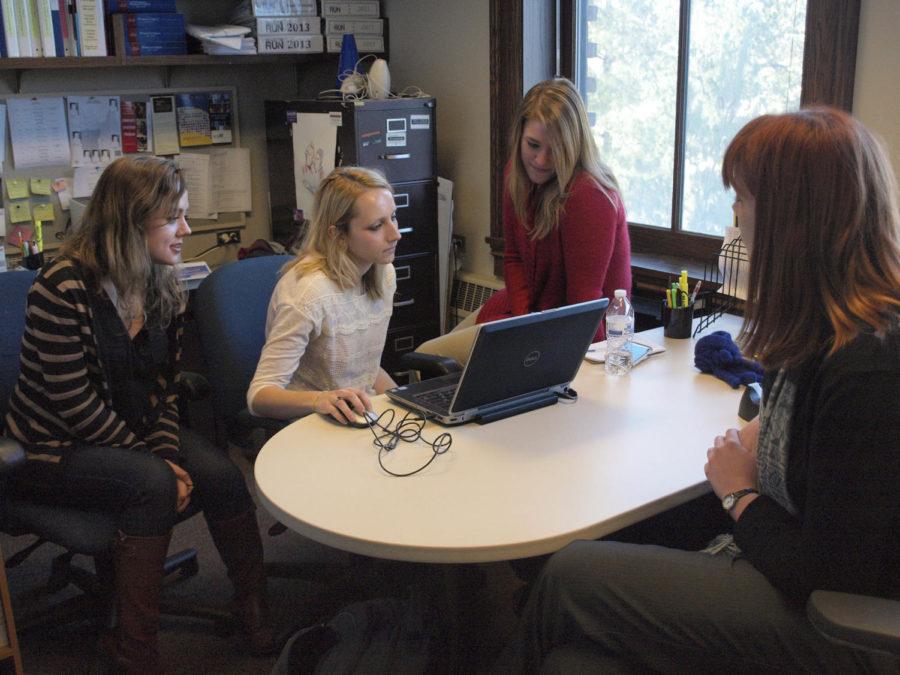Catt Center conducts research on political gender balance in Iowa
Tiffany Herring/Iowa State Daily
Krista Johnson, Hallie Golay, and Morgan Todd are doing research on women’s studies and gender balance that is being used by policy makers and researchers. Their research is led by Valerie Henning.
December 12, 2013
The Carrie Chapman Catt Center for Women in Politics is a resource for female students that is organizing both the upcoming Women’s Leadership Retreat and Campaign College 2014. The implementation of these events and, at times, their inspiration are derived in part from student research being conducted at the Catt Center.
Morgan Todd, senior in political science and a research assistant to Valerie Hennings PhD., adjunct assistant professor in political science and researcher at the Catt Center, are currently finishing up work on the gender balance project, which has been conducting original research since July 2012.
“The research encompasses the 203 most populous cities in Iowa, as well as all 99 counties,” Todd said. “We are examining seven boards and commissions at the county level, and nine at the municipal level, analyzing whether or not they are gender balanced.”
Todd explained what constitutes gender balance.
“If seven people are on a board, then the board needs four members of one sex and three of the other to be considered balanced,” Todd said. “In Iowa, only two counties and 17 cities met the criteria.”
What makes the research original is that the state of Iowa is the only state in the nation to require by law a gender balance at both the county and municipal levels, as well as at the state level, Todd said.
An important distinction to make is that members of these boards and commissions are not elected but are appointed by Iowa mayors, Todd said.
Todd will be presenting her research at three symposiums, including at an annual conference in Chicago, which is put on by the Midwest Political Science Association.
“As we saw at the state level, [gender balance law] was implemented in 1987 when very few women were serving in these positions,” Todd said. “By 2006, we were up to 49.9 percent women serving. I’m really hoping to see a trickle down effect … just as we saw at the state level.”
Todd is not the only researcher making strides at the Catt Center.
Hallie Golay, graduate research assistant in political science, is tracking gender numbers of mayors and city council members both before and after last November’s elections.
“This research is going to part of a larger project, which is a women in Iowa politics database that tracks the number of women participating in politics across various levels and positions throughout the state,” Golay said.
The results of Golay’s research on elected officials are less conclusive as she is still in the process of obtaining all the relevant data. Despite that, Golay was able to offer some insight into the trends that are emerging.
“When you have more women in these positions, you’re going to inspire more women to run,” Golay said. “Once you start from such a low number, it will increase steadily at first but then level off. Once you reach a certain level its hard to keep trending upwards, so over the last few years [the numbers of women in Iowa politics] have not increased dramatically.”
Golay’s research is also being utilized, along with research from “ready to run,” programs like Campaign College 2014, to help inspire similar programs at other universities.
Krista Johnson, senior in political science and a Catt Center research assistant, is working on a similar project as Golay, with a focus shift toward the female presence on school boards throughout the state.
“Our hypothesis was there might be more women involved on school boards,” Johnson said. “It’s the ongoing mission of the Catt Center to get more women involved in politics and study how they end up involved. It’s valuable to know where these women interested in politics are, so we can figure out what motivates them in the first place.”
Johnson’s research, like Golay’s, is still in progress, but her early findings have pointed toward the initial hypothesis as valid.
“So far in the preliminary stages of our research, it does appear there are more women on school boards than city councils,” Johnson said.
The research being conducted at the Catt Center has influenced Todd, Golay, and Johnson, as all plan to pursue further education and eventual employment in the fields of politics and political research.
“I like doing this research even more than I expected,” Johnson said. “School board research wasn’t necessarily something that sounded interesting going into it, but it has wound up being remarkably fascinating.”







